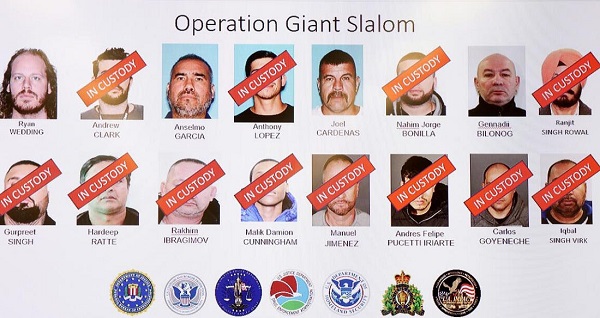Censorship Industrial Complex
UK mother imprisoned over tweet says she was ‘political prisoner’ of Keir Starmer

From LifeSiteNews
Lucy Connolly, a former child-care worker, was given a 31-month sentence after slamming illegal immigrants in response to the murder of three little British girls.
A mother from the U.K. who spent over a year in prison for an ill-advised tweet has said she was a “political prisoner” of Prime Minister Keir Starmer.
In a recently released, hour-long interview with The Telegraph, Lucy Connolly shared her story of how she was sent to jail for allegedly stirring up racial hatred in a social media post that she deleted only hours after it was published.
When the interviewer asked if she was Keir Starmer’s political prisoner, she replied, “Absolutely.”
Connolly is a 42-year-old wife, mother, and former childminder. Last year, she made an angry post on X after a migrant had killed three girls at a Taylor Swift-themed dance class in Southport.
She wrote: “Mass deportation now set fire to all the effing hotels full of the bastards for all I care. While you are at it, take the treacherous government and politicians with you. I feel physically sick knowing what these families will now have to endure. If that makes me racist, so be it.”
In the interview with The Telegraph, she said she “was not thinking rationally” when she posted the statement. Thinking better of it, Connolly deleted the ill-advised post a few hours later. However, someone had already screenshotted the tweet and reported her to the police.
Connolly told the interviewer that she was not racist and that 90 percent of the families of the children she took care of had immigration backgrounds. She stated that she even helped them with their visa applications and only opposes illegal and unvetted immigration to the U.K.
Eight days after she sent and deleted the tweet, police showed up at her house and arrested her for inciting racial hatred.
Connolly said that because of the charged political climate at the time around the immigration issue, it appears that Prime Minister Keir Starmer’s government wanted to make an example of people like her who held the government responsible for the wave of migrant crime.
As the allegedly racist wife of a Tory counselor, she fit the bill perfectly for Labour Prime Minister Starmer.
According to her lawyer and legal counselors ”these weren’t normal circumstances” and ”they were giving out a lot heftier sentences to people than they ordinarily would.”
On August 4 last year, Starmer made the following statement in response to the protests against the migrant violence: “ I utterly condemn the far-right thuggery. Be in no doubt that those who have participated in violence will face the full force of the law. The police will be making arrests. Individuals will be held on remand. Charges will follow, and convictions will follow. I guarantee you’ll regret taking part in this disorder, whether directly or those whipping up this action online.”
“ Lucy, you were denied bail six days after the prime minister made that statement,” the interview told Connolly.
”You were a perfect candidate for bail, first-time offender, not a flight risk, but bail was denied. It was denied twice. Lucy, do you think Keir Starmer influenced the way you and others were treated by the criminal justice system?”
”A hundred percent, yes,” she replied.
Connolly suffered abuse during her time in prison
As Connolly was imprisoned and held on remand and could not see her daughter, she worried that if she tried to fight the case, the trial could be delayed for months or years, making it impossible for her to be with her family.
So Connolly, upon advice of her attorney, pleaded guilty to the charges of stirring up racial hatred in hopes of getting a lenient sentence.
”I have a daughter that needs me. You know, I’m a stay-home mommy. She’s had me there her whole life, and all I was thinking was, what is my quickest route to her?” she explained.
The 42-year-old mother could provide many mitigating factors, like her previous good character, a pile of references from immigrant parents who said that she was a very kind person, and the fact that she lost her son in 2011 due to medical neglect, which left her with post-traumatic stress disorder.
However, the judge did not give any weight to these factors nor to the fact that she pleaded guilty and instead slapped her with a 31-month custodial sentence.
Connolly said that even though she showed exceptional behavior in prison and all the officers liked her, all her attempts at probation were denied, while those who committed more serious crimes were often granted probation.
“They were done for death by dangerous driving for very serious crimes, but they were allowed out. And you, who had a 12-year-old daughter and a husband with a bone marrow condition, constantly told no,” the interviewer said.
One of the reasons the authorities gave for denying probation was that “the media interest is too high” in her case, even though the Ministry of Justice does not list that as one of the possible reasons.
During her time in prison, Connolly also had a run-in with a counter-terrorism group, who she said unnecessarily handcuffed her and hurt her to send a message.
“The handcuffs were so tight they couldn’t get them off. And there was all bruises all over my arms. And I’ve still got, I need to go to a chiropractor about my back and my shoulder because they hurt me so badly, and it was completely unnecessary,” she said, recalling the incident.
“Different officers do it different ways, but they can really hurt you if they want to. And they decided on that day they were gonna really hurt me, and I mean, really hurt me.”
A wave of support and an unbroken spirit
Connolly said she received much support, including a crowdfunder that raised nearly 160,000 pounds for her.
”I, for some reason, seem to have had the most coverage, but there are people who are in equally awful situations that shouldn’t be in there. And we should also be fighting for them and remembering them, and when they come out, give them the same support as what I’m getting from people as well,” she said.
She noted that she will continue to fight for freedom of speech in Britain and that she will meet a senior representative of the Trump administration.
In May, the U.S. government announced it would send a team of officials to the U.K. to investigate concerns over free speech restrictions. Trump said that the U.S. was “monitoring” Connolly’s case.
The 42-year-old mother closed with fiery remarks, stressing that her spirit was not broken and that she would continue to fight.
”You won’t keep me down.”
“Like I said to all the people that you know during the [time] I was sent to prison, think it’s a good thing, think it’s funny, hope that they broke me while I was in there.”
“But I’m here to tell you that they didn’t. And I hope that I can use my experience to now do good, to reform the system, to hopefully make people listen to me,” she concluded.
Banks
Debanking is Ottawa’s quiet tool to crush dissent

This article supplied by Troy Media.
 By Lee Harding
By Lee Harding
The rise of debanking threatens free speech and financial rights. Canadians have a right to be worried
If you thought bank account freezes ended after the 2022 convoy, think again. “Debanking”—the practice of banks abruptly closing accounts, often without a clear explanation—is on the rise in Canada and the U.S., and it’s fast becoming a tool to silence dissent.
Alberta lawyer Eva Chipiuk is a recent debanking victim. On July 17, the Royal Bank of Canada (RBC) sent her a letter saying she could no longer have an account there. She posted RBC’s letter, which offered little explanation beyond stating her recent account activity was “outside of RBC’s client risk appetite,” on X. She was told to transfer her funds to another financial institution within 31 days.
In an interview with the Financial Post, Chipiuk said she had made two $1,000 transfers to cryptocurrency platform Shakepay Inc. over two consecutive days to buy Bitcoin. The second transfer was blocked by the bank and triggered an account freeze. She went to the bank to have her account restored. A few days after succeeding, she received the letter saying her accounts would again be closed until mid-August.
While banks often flag cryptocurrency transactions for review because of antimoney-laundering regulations, such activity is lawful.
If that alone were grounds for debanking, more than four million Canadians would be at risk. According to the Triple A Global Cryptocurrency
Report, about 10.1 per cent of Canadians own cryptocurrency.
However, buying crypto does not appear to be the real reason. Chipiuk represented protesters from the Freedom Convoy, which began in
opposition to COVID-19 vaccine mandates and sweeping pandemic restrictions, and cross-examined then-prime minister Justin Trudeau
in 2022 at the Public Order Emergency Commission hearings in Ottawa.
In 2022, Canadian banks froze $7.8 million from 200 accounts related to the convoy. A single mother in B.C. complained to her MP, Mark Strahl, that her bank account was frozen after giving a $50 donation to the convoy, which was legal at the time. In response, the prime minister and deputy prime minister said financial measures were meant only to target convoy leaders.
The convoy is over, but debanking is not. The Ombudsman for Banking Services and Investments opened 94 cases related to debanking in 2024 and 105 in 2023. A spokesperson for the organization told the Financial Post: “We are not able to challenge or change a bank’s decision. We are also generally not able to tell the consumer the bank’s reason for account closure.”
Debanking has also emerged as an issue in the United States. U.S. President Donald Trump complained about it in his Jan. 20 video conference with the World Economic Forum. He told Brian T. Moynihan, chair, president and CEO of Bank of America: “I hope you start opening your bank to conservatives because many conservatives complain that the banks are not allowing them to do business.”
Democratic Senator Elizabeth Warren agreed. At a Senate committee hearing on Feb. 8 entitled “Investigating the Real Impacts of Debanking in America,” she said: “Donald Trump was onto a real problem when he criticized Bank of America for its de-banking practices.”
Warren said de-banked U.S. customers “all reported common themes,” namely: “No warning. No explanation. No chance to dispute or appeal. They described how one day, all of a sudden, they lost their place in the banking system.” The Consumer Financial Protection Bureau has received 12,000 debanking complaints over the past three years. Georgia, Florida and Tennessee have introduced laws to curb debanking.
A completely de-banked person is left with only cash, but in Canada, Bill C-2 could significantly worsen their predicament. If passed, federal law will ban cash transactions of $10,000 or more to a business or non-profit for any given thing, whether that amount is in a lump sum or a series of payments.
Encroachments on free speech and financial rights are paving the way for a dystopian future, where those who refuse to bow to government diktat or bankfavoured ideologies are shut out of the financial system.
Canadians and Americans must defend their freedoms now, before a digital technocracy emerges to cancel and crush dissent.
Lee Harding is a research fellow for the Frontier Centre for Public Policy
Troy Media empowers Canadian community news outlets by providing independent, insightful analysis and commentary. Our mission is to support local media in helping Canadians stay informed and engaged by delivering reliable content that strengthens community connections and deepens understanding across the country.
Censorship Industrial Complex
‘Authoritarian censorship’: Poilievre denounces nurse’s suspension for opposing gender ideology

From LifeSiteNews
Conservative leaders, including Pierre Poilievre, are defending British Columbia nurse Amy Hamm, who was fined over $93,000 and suspended for stating gender is based on biology.
Conservatives are coming to the defense of British Columbia nurse Amy Hamm after was fined over $93,000 for saying gender is based on biology.
In an August 20 post on X, Conservative Party leader Pierre Poilievre denounced a ruling by the British Columbia College of Nurses and Midwives (BCCNM) that mandated Hamm pay $93,639.80 in legal fees and suspended her license for one month for her statements opposing LGBT ideology.
“A nurse with a spotless track record gets fined and suspended for pointing out there are two genders, and for praising world renowned author & women’s rights advocate
@jk_rowling,” Poilievre declared.
“This is authoritarian censorship,” he warned. “We must restore free speech and free thinking in a free country.”
Many other Conservative Members of Parliament (MPs) also came to Hamm’s defense, condemning the actions taken against her as censorship while voicing concerns over the implications of punishing professionals for publicly voicing their opinions.
“Fining a nurse $93,000 for acknowledging biological sex is punishing her for recognizing a scientific reality required to safely practice medicine,” MP Leslyn Lewis wrote on X. “We cannot ignore that in medicine, biological sex matters.”
“Nurses and doctors have to distinguish between sex and gender in order to treat patients safely — for example, when prescribing medications, diagnosing conditions, or determining appropriate procedures,” she added.
Additionally, Lewis raised concerns over “whether a professional can safely do their job if they are punished for acknowledging biological realities.”
Similarly, MP Andrew Scheer called the ruling “completely unjust,” adding that “everyone who cares about free speech should be outraged!”
Scheer quoted a 1926 warning from British author G.K. Chesterton that read, “We shall soon be in a world in which a man may be howled down for saying that two and two make four, in which people will persecute the heresy of calling a triangle a three-sided figure, and hang a man for maddening a mob with the news that grass is green.”
In March, a ruling from the BCCNM disciplinary panel found that Hamm committed “unprofessional conduct” by publicly discussing the dangers of the LGBT agenda in three articles and a podcast appearance.
Later that month, Hamm shared on social media that Vancouver Coastal Health fired her from her nursing position without severance after she was found guilty of “unprofessional conduct.”
Hamm found herself targeted by the BCCNM in 2020 when she co-sponsored a billboard reading, “I (heart) JK Rowling.” This sign was a nod to the famous British author’s public comments defending women’s private spaces from being used by gender-confused men.
The BCCNM accused Hamm of making “discriminatory and derogatory statements regarding (so-called) transgender people” while identifying herself as a nurse or nurse educator.
According to the college, Hamm’s statements were “made across various online platforms, including but not limited to podcasts, videos, published writings, and social media” between July 2018 and March 2021.
In July, Hamm filed human rights complaints with the British Columbia Human Rights Tribunal to hold both organizations accountable for targeting her over her beliefs. She has since announced that she is taking her case to the British Columbia Supreme Court.
-

 Business2 days ago
Business2 days agoU.S. rejection of climate-alarmed worldview has massive implications for Canada
-

 Business2 days ago
Business2 days agoMounties, Overstretched and Overmatched by Foreign Mafias, No Longer Fit for Service
-

 Crime2 days ago
Crime2 days ago8-year-old and 10-year-old killed in church pews, 17 others injured in shooting at Minneapolis Catholic church
-

 C2C Journal1 day ago
C2C Journal1 day agoHow Canada Lost its Way on Freedom of Speech
-

 Artificial Intelligence2 days ago
Artificial Intelligence2 days agoParents sue OpenAI, claim ChatGPT acted as teen’s “suicide coach”
-

 Business2 days ago
Business2 days agoTrump goes on attack over digital services taxes, threatens tariffs
-

 Daily Caller2 days ago
Daily Caller2 days agoTrump Team Floated Energy Incentives With Russia In ‘Sideline’ Ukraine Peace Talks
-

 Crime23 hours ago
Crime23 hours agoHigh-Profile PRC Fentanyl Financier Evades U.S. Extradition in Mexico City Tunnel Escape






